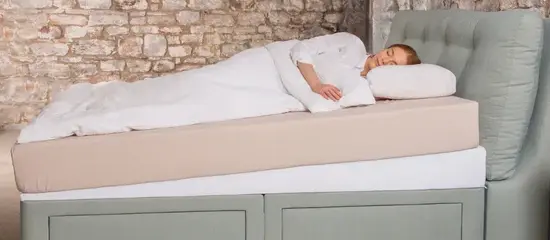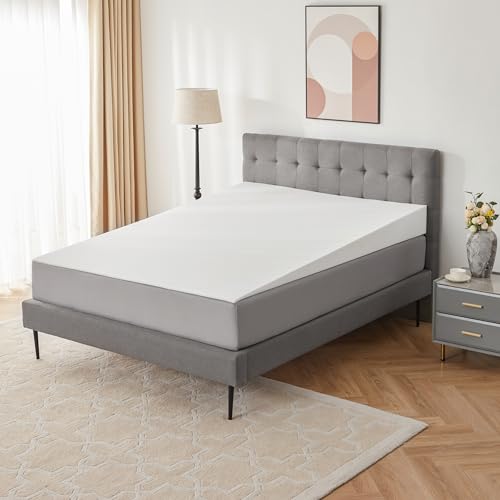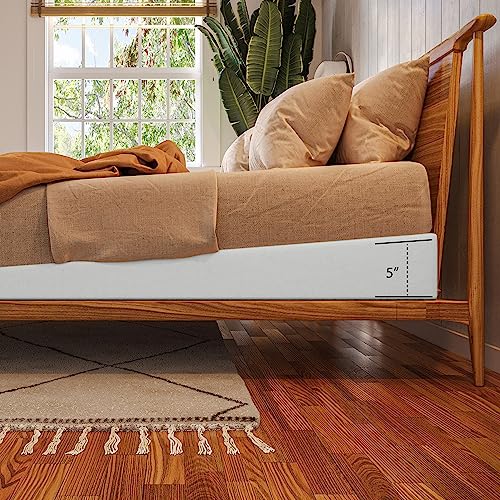For those seeking natural ways to enhance health and improve sleep, Inclined Bed Therapy (IBT) offers a simple yet powerful solution. By raising the head of your bed just 4-6 inches, you can tap into a range of benefits, from better brain detox through glymphatic drainage to relief from common issues like snoring and acid reflux. This practice, supported by emerging research and anecdotal evidence, could transform your nightly rest into a healing experience. Let's explore how sleeping on a slight incline can address multiple health concerns and why it's worth trying.
What Is Inclined Bed Therapy and How Does It Work?
Inclined Bed Therapy involves elevating the head of your bed to create a gentle slope, typically between 4-6 inches, using blocks or risers under the bedposts. This subtle angle leverages gravity to support bodily functions during sleep. According to insights from Medical News Today, this positioning may enhance circulation, reduce pressure on certain body parts, and promote natural detoxification processes. Unlike adjustable beds, which can be costly, IBT offers an affordable way to experiment with elevated sleeping and experience its potential advantages firsthand.
The concept isn't just about comfort, it's rooted in the idea that our bodies evolved to benefit from slight inclines, much like how animals often rest on sloped terrain. As we dive into the specific benefits, you'll see how this practice ties into key areas of health and wellness.
Boosting Brain Detox Through Glymphatic Drainage
One of the standout benefits of Inclined Bed Therapy is its potential to support brain detox via the glymphatic system, a waste-clearance mechanism in the brain. Research summarized by VeryWell Health suggests that sleeping on an incline may improve the flow of cerebrospinal fluid, helping to flush out toxins linked to neurodegenerative conditions. For even better results, studies highlighted in PMC indicate that sleeping on your right side while on an incline can optimize this process.
Kolbs Bed Wedge Pillow for Sleep Apnea, FSA Eligible Acid Reflux, and Back Pain Relief, with Chic Jacquard Cover - Headboard Wedges for Sleeping (Standard Width 7.5" Height)
Polyester
FSA Eligible. Experience unparalleled comfort with our sleep apnea pillow, designed to elevate your upper body and improve breathing, making it an essential addition to your sleep apnea devices collection. Kolbs wedge pillow for acid reflux relief.
Perfect headboard wedge pillow for sitting up in bed. Use it as a supportive headboard wedge while reading, watching TV, or working on your laptop in bed. The firm yet comfortable incline helps you sit upright without straining your neck or back.
Luxurious and stylish jacquard pillow case Hey it’s your bedroom, not a hospital room, give it some style. The Kolbs Wedge features a classic yet contemporary design. The removable jacquard pillow case protects the incline pillow from stains while promoting a comfortable night’s sleep. Cover is machine washable and can be removed from the wedge cushion core.
The upper layer of the triangle pillow bed wedge features plush memory foam for a comfortable and relaxing night's sleep. A high density core layer supports the memory foam top to ensure just the right firmness and proper support.
A good day starts with a great night’s sleep. Back pain, knee pain, restless leg syndrome, post surgery, and other medical conditions can often rob you of the sleep your body needs. The Kolbs wedge pillow offers optimal positioning for a comfortable and relaxing slumber. Use this triangle wedge to build your Kolbs wedge pillow set for after surgery.
View on AmazonThis is particularly exciting for health-minded individuals concerned about cognitive decline or simply wanting to keep their minds sharp. By adopting IBT, you're not just resting, you're actively supporting your brain's nightly maintenance.
Easing Physical Ailments: From Lower Back Pain to Acid Reflux
Sleeping on a slight incline can also address several physical discomforts. For those dealing with lower back pain, the angle helps decompress the spine, reducing pressure on discs and nerves. Airpedic notes that this positioning can mimic the effects of traction, offering relief without invasive treatments.
Similarly, acid reflux sufferers may find significant improvement with IBT. Elevating the head prevents stomach acid from flowing back into the esophagus, a common trigger for heartburn. This benefit, also mentioned in Medical News Today, makes inclined sleeping a go-to remedy for managing GERD naturally.
Additionally, nasal congestion from allergies or colds can lessen with an elevated head position, as it promotes sinus drainage. Meanwhile, sleep apnea and snoring often improve due to better airway alignment, providing a non-invasive option for those struggling with disrupted rest.
Supporting Body Systems: Lymphatic Drainage and Thermoregulation
Beyond specific ailments, Inclined Bed Therapy can enhance overall bodily functions. Lymphatic drainage, a critical process for immune health and detoxification, may be improved by the subtle gravitational pull of an inclined position. This can help reduce swelling and support the body's natural cleansing mechanisms, as discussed in broader sleep health contexts by VeryWell Health.
Another often-overlooked advantage is better thermoregulation. Sleeping on an incline can improve blood flow and prevent overheating, creating a more comfortable sleep environment. For those who wake up feeling too hot or sweaty, this small change could make a noticeable difference in rest quality.
Enhancing Sleep Quality and Reducing Nighttime Disruptions
At its core, IBT is about achieving deeper, more restorative rest. Improved sleep quality is a direct outcome of the combined benefits, less snoring, reduced nighttime urination due to better fluid distribution (as noted by Airpedic), and overall physical ease. When your body isn't battling discomfort or interruptions, you're more likely to cycle through deeper sleep stages, waking up refreshed.
Mattress Wedge Only, 7-Inch Queen Inclined Bed Wedge Mattress Topper for Acid Reflux, GERD, Neck & Back Pain, Snoring, Adjustable Elevator Under Mattress Support for Bedroom
【Warm Tips】In order to reduce the damage during transportation, we attached a dust cover, you can remove it after receiving the product. The mattress wedge topper is compressed by a roll. Please decompress it flat before use, and place it in a well-ventilated environment for 24-72 hours to fully expand. The expansion time of the mattress elevator will vary depending on the environment.
【Improve Health】This wedge mattress topper is designed to relieve GERD, Acid reflux, snoring, postnasal drip, and cough. This inclined bed elevator is also suitable for promoting blood circulation, releasing pressure on shoulders, neck, and back, postoperative recovery, and breathing problems.
【Multi-purpose use】 This wedge mattress elevator provides four ways of use. Under the mattress: 1. As a mattress elevator. 2. As a leg elevator. Above the mattress: 3. As a wedge topper. 4. As a leg rest topper. In addition, it can be easily placed, and you can adjust it according to your needs.
【High-Quality Materials】To promote your health, this mattress wedge is made of CertiPUR-certified high-density foam. It provides you with good support and comfortable sleep along with comfort and convenience.
【Multi-size options】This bed wedge mattress elevator has options of 5 inches or 7 inches, you can choose the suitable size. If you have any questions about our products, please easy free to contact us, and we will do our best to help you.
View on AmazonThis makes Inclined Bed Therapy particularly appealing for anyone prioritizing wellness through better rest. Whether you're an older adult dealing with frequent nighttime bathroom trips or simply someone seeking more consistent energy, IBT offers a low-effort way to upgrade your sleep routine.
How to Get Started with Inclined Bed Therapy
Ready to try it? Start by placing sturdy blocks or bed risers under the head posts of your bed to achieve a 4-6 inch elevation. Begin with a smaller incline if you're unsure, and adjust as your body adapts. Use a level to ensure the slope is even, and secure the risers to prevent slipping. For those targeting brain detox, remember to sleep on your right side as suggested by research in PMC.
It's wise to monitor how your body responds over a few weeks. Some may feel immediate relief, while others might need time to adjust to the new position. If you have existing health conditions, consult a healthcare provider before making changes to your sleep setup.
Avana Mattress Elevator 5-Inch - Gentle Incline Under Mattress Support - Riser for Snoring, Acid Reflux, and Sinus Relief, Queen
Gentle 5″ Incline for Sensitive Sleepers — Our high-density foam mattress elevator offers a subtle incline that provides effective elevation without dramatically raising your bed; ideal for users who want relief from acid reflux or respiratory issues without sacrificing sleep comfort.
Two‑Piece Split Design for Easy Installation & Storage — Queen size is delivered as two 30″ wide slanted sections for a standard queen bed — makes insertion under a heavy mattress simple.
Drug‑Free Relief for GERD & Acid Reflux — Elevated support naturally helps reduce symptoms of acid reflux, GERD, snoring, sinus congestion, and other related conditions — no medication required.
Works with Standard Flat Sheets — Compatible with a standard flat sheet for a seamless look; premium cotton/poly fitted covers sold separately
USA‑Made Foam with CertiPUR‑US Certification — Constructed from premium high-density foam in Atlanta, certified for low VOC, no harmful substances, and backed by a manufacturer guarantee. Packaged roll compressed to reduce our carbon footprint.
View on AmazonConclusion: A Simple Step Toward Better Health
Inclined Bed Therapy isn't a cure-all, but it's a compelling, low-cost strategy to address a variety of health concerns while improving sleep quality. From supporting brain detox through glymphatic drainage to easing issues like acid reflux, lower back pain, and sleep apnea, the benefits are wide-ranging and backed by both research and practical insights. With guidance from trusted sources like Medical News Today and VeryWell Health, it's clear that a slight incline could be the missing piece in your wellness puzzle. Why not elevate your bed and your health starting tonight?



